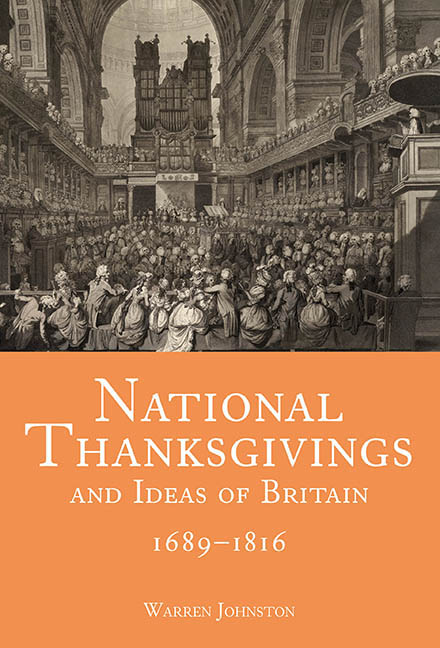Book contents
- Frontmatter
- Dedication
- Contents
- Acknowledgements
- Notes on elements of the text
- List of general thanksgiving days 1689–1816
- Introduction
- 1 Sermons and thanksgiving-day sermons in the long eighteenth century
- 2 Thanksgiving-day sermons – purposes and meanings
- 3 ‘The Palladium of our Safety’ – Providence and Britain
- 4 Political theory and principles
- 5 ‘This Carping Age’ – the politics of unity and discord
- 6 War
- 7 Costs of war and consequences of peace
- 8 Commerce and Empire
- 9 Anglicanism, dissent, anti-Catholicism, and infidelity
- 10 Others and Britons
- Conclusion
- Appendix A Thanksgiving-day preachers’ and sermon details
- Appendix B Denominational breakdown of thanksgiving-day preachers
- Appendix C Main scriptural texts used for thanksgiving-day sermons
- Bibliography of primary sources
- Bibliography of secondary sources
- Index
3 - ‘The Palladium of our Safety’ – Providence and Britain
Published online by Cambridge University Press: 02 May 2020
- Frontmatter
- Dedication
- Contents
- Acknowledgements
- Notes on elements of the text
- List of general thanksgiving days 1689–1816
- Introduction
- 1 Sermons and thanksgiving-day sermons in the long eighteenth century
- 2 Thanksgiving-day sermons – purposes and meanings
- 3 ‘The Palladium of our Safety’ – Providence and Britain
- 4 Political theory and principles
- 5 ‘This Carping Age’ – the politics of unity and discord
- 6 War
- 7 Costs of war and consequences of peace
- 8 Commerce and Empire
- 9 Anglicanism, dissent, anti-Catholicism, and infidelity
- 10 Others and Britons
- Conclusion
- Appendix A Thanksgiving-day preachers’ and sermon details
- Appendix B Denominational breakdown of thanksgiving-day preachers
- Appendix C Main scriptural texts used for thanksgiving-day sermons
- Bibliography of primary sources
- Bibliography of secondary sources
- Index
Summary
To touch on every mention of providential intervention in thanksgiving-day sermons would, as one late eighteenth-century preacher put it, require ‘a volume, rather than a single discourse’. Thanksgiving days were founded on the premise of active and ongoing divine operation in the world, making providence the essential element of consideration: it was God who had intervened on Britain's behalf, and God was to be thanked for that oversight and benevolence. Preachers like Thomas Taylor, the vicar of Bicester in Oxfordshire, drove this home to his audience by asking: if God ‘were unconcern’d at the Successes, or Misfortunes of our Present Life, of what use would be a great part of our Services and Devotions? Why should we pray unto him for temporal Mercies, or return thanks for Benefits received… if there were nothing in the whole event, but what was owing to humane Strength and Policy, and the natural course of things?’ Whether in passing or as a principal theme, every thanksgiving-day sermon throughout the period from 1689 to 1816 mentions the role of providence in some way. To appropriate the phrase Alexandra Walsham applies to events like the Armada and the Gunpowder Plot, thanksgiving days were celebrations of ‘providential landmarks’ in the late seventeenth, the eighteenth, and the early nineteenth centuries.
Walsham's study of Providence in Early Modern England proves the great significance of the concept of providentialism to English culture and worldview in the sixteenth and seventeenth centuries. It was not simply a religious viewpoint, but instead permeated early modern English understanding of how God, and the world, functioned, ‘a set of ideological spectacles through which individuals of all social levels and from all positions on the confessional spectrum were apt to view their universe’. Walsham also asserts that special celebrations marking important providential anniversaries and victories were used successfully by the government to develop a sense of community amongst English people, and Mary Morrisey and Natalie Mears have confirmed that the sermons for those occasions reinforced the providential understanding of contemporary events, as well as those which had occurred throughout English history.5 Jonathan Clark argues that this providential understanding of worldly affairs carried into the eighteenth century.
- Type
- Chapter
- Information
- National Thanksgivings and Ideas of Britain, 1689–1816 , pp. 59 - 90Publisher: Boydell & BrewerPrint publication year: 2020



